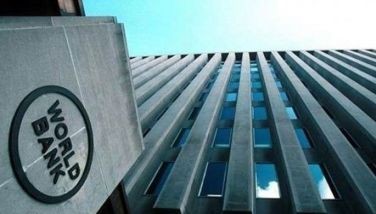NHMFC, Deutsche Bank real estate arm ink P5.3-B deal
April 23, 2005 | 12:00am
The National Home Mortgage Finance Corp. (NHMC) and the real estate arm of Deutsche Bank signed yesterday a P5.3-billion deal which paved the way for the creation of a joint venture partnership between the state-owned shelter agency and Deutsche Bank Real Estate Global Opportunities (DBGO).
DBGO agreed to purchase approximately 50,000 delinquent loans or 51 percent interest in NHMFC’s total bad loan portfolio and eventually form a special purpose entity (SPE) which will manage the restructuring and collection of the loans.
The NHMFC will have a 49 percent stake in the SPE and an equivalent share in the proceeds of future collections of its bad loans.
The purchased loan portfolios included residential mortgage loans of the most delinquent borrowers in the Unified Home Lending Program (UHLP), a defunct government housing program.
These UHLP loans, about 220,000 date back between 1987 and 1996 to borrowers who are members of the Social Security System and Pag-IBIG Fund.
"The special purpose entity will be able to make available to our borrowers more flexible restructuring terms than what NHMFC currently is able to offer under existing government regulations. Deutsche Bank will bring its considerable expertise in servicing non-performing loans to help restore as many borrowers as possible to performing status," NHMFC president Celso delos Angeles Jr. said.
"I promised to return the corporation (NHMFC) to profitability and implement new management concepts that would ultimately lead to a more effective organization that eventually serves the people’s need for low-income housing, and this I did," Delos Angeles said.
DBGO won the bid to buy NHMFCs soured loans, besting US financing giants Lehman Brothers and Goldman Sachs which also joined the open auction.
The joint venture partnership, formally launched in a signing ceremonies for the closing of the non-performing loan sale made by NHMFC to DBGO held at the Mandarin Oriental Hotel in Makati City, marks the first time that a local financial entity sold non-performing loans of such magnitude to a foreign investor.
Among those who graced the occasion were Vice President and Housing and Urban Development Coordinating Council (HUDCC) chairman Noli De Castro and Paranaque Rep. Eduardo Zialcita.
In a statement released yesterday, DBGO said it plans to work closely with the NHMFC to improve the servicing efficiency for the benefit of the borrowers, the NHMFC and the Philippine taxpayers.
"I think the biggest challenge for the transaction was how to manage 55,000 loans and to do that you have to make a serious commitment to set up a large organization in the Philippines. I think Deutsche Bank is planning to set up an organization with 300 to 400 employees to address the needs of the borrowers and that is even more than the number of employees that NHMFC is dedicating for these particular loans," Delos Angeles said.
"DBGO from our perspective was the group who most seriously tackled the issue of how to manage the loans," he added.
"Its really a win-win situation. The borrowers can restructure at a lower overall cost and NHMFC can realize a much higher recovery on the loans from its share future cash payments made by the restructure borrowers," Delos Angeles pointed out.
As of 2003, NHMFC already repaid P40.4 billion but obligations increased to P53.2 billion because of interest and penalties.
The NHMFC was established in 1979 to serve as the country’s secondary mortgage institution and to act as the government’s primary issuer of mortgage loans. It continues to manage the remaining UHLP loan portfolio worth P41.4 billion.
With the adoption of the proposed Securitization Law, NHMFC plans to issue the country’s first- ever asset backed securities later in the year with the help of the Asian Development Bank and the US Overseas Private Investment Corp.
DBGO agreed to purchase approximately 50,000 delinquent loans or 51 percent interest in NHMFC’s total bad loan portfolio and eventually form a special purpose entity (SPE) which will manage the restructuring and collection of the loans.
The NHMFC will have a 49 percent stake in the SPE and an equivalent share in the proceeds of future collections of its bad loans.
The purchased loan portfolios included residential mortgage loans of the most delinquent borrowers in the Unified Home Lending Program (UHLP), a defunct government housing program.
These UHLP loans, about 220,000 date back between 1987 and 1996 to borrowers who are members of the Social Security System and Pag-IBIG Fund.
"The special purpose entity will be able to make available to our borrowers more flexible restructuring terms than what NHMFC currently is able to offer under existing government regulations. Deutsche Bank will bring its considerable expertise in servicing non-performing loans to help restore as many borrowers as possible to performing status," NHMFC president Celso delos Angeles Jr. said.
"I promised to return the corporation (NHMFC) to profitability and implement new management concepts that would ultimately lead to a more effective organization that eventually serves the people’s need for low-income housing, and this I did," Delos Angeles said.
DBGO won the bid to buy NHMFCs soured loans, besting US financing giants Lehman Brothers and Goldman Sachs which also joined the open auction.
The joint venture partnership, formally launched in a signing ceremonies for the closing of the non-performing loan sale made by NHMFC to DBGO held at the Mandarin Oriental Hotel in Makati City, marks the first time that a local financial entity sold non-performing loans of such magnitude to a foreign investor.
Among those who graced the occasion were Vice President and Housing and Urban Development Coordinating Council (HUDCC) chairman Noli De Castro and Paranaque Rep. Eduardo Zialcita.
In a statement released yesterday, DBGO said it plans to work closely with the NHMFC to improve the servicing efficiency for the benefit of the borrowers, the NHMFC and the Philippine taxpayers.
"I think the biggest challenge for the transaction was how to manage 55,000 loans and to do that you have to make a serious commitment to set up a large organization in the Philippines. I think Deutsche Bank is planning to set up an organization with 300 to 400 employees to address the needs of the borrowers and that is even more than the number of employees that NHMFC is dedicating for these particular loans," Delos Angeles said.
"DBGO from our perspective was the group who most seriously tackled the issue of how to manage the loans," he added.
"Its really a win-win situation. The borrowers can restructure at a lower overall cost and NHMFC can realize a much higher recovery on the loans from its share future cash payments made by the restructure borrowers," Delos Angeles pointed out.
As of 2003, NHMFC already repaid P40.4 billion but obligations increased to P53.2 billion because of interest and penalties.
The NHMFC was established in 1979 to serve as the country’s secondary mortgage institution and to act as the government’s primary issuer of mortgage loans. It continues to manage the remaining UHLP loan portfolio worth P41.4 billion.
With the adoption of the proposed Securitization Law, NHMFC plans to issue the country’s first- ever asset backed securities later in the year with the help of the Asian Development Bank and the US Overseas Private Investment Corp.
BrandSpace Articles
<
>
- Latest
- Trending
Trending
Latest






















